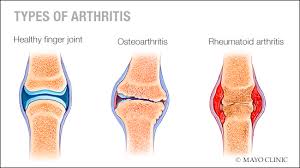What to do about Arthritis?
INFLAMMATION AND ARTHRITIS
It is becoming increasingly clear that chronic inflammation is the root cause of many serious illnesses – including heart disease, many cancers, and Alzheimer’s disease. We all know inflammation on the surface of the body as local redness, heat, swelling and pain. It is the cornerstone of the body’s healing response, bringing more nourishment and more immune activity to a site of injury or infection.
But when inflammation persists or serves no purpose, it damages the inside of the body and causes illness. Arthritis, asthma, colitis, headaches, obesity have inflammation in common.
Stress, lack of exercise, genetic predisposition, and exposure to toxins (like secondhand tobacco smoke) can all contribute to such chronic inflammation, but dietary choices play a big role as well.
Osteoarthritis comes on gradually, often after injury to the bone. It does not migrate from one part of the body to another.
Rheumatoid arthritis comes on suddenly or gradually, with many joints involved. It can and often does migrate to other joints.

TRADITIONAL ORIENTAL MEDICINE
From Traditional Medicine point of view, arthritis is marked by mineral imbalances in the affected tissue, with calcium status being a good indicator of mineralization in general. Wind and dampness, the results of a stagnant liver, prevent chi from being smoothly distributed to joints and connective tissue.
Dampness is often generated by toxic, mucus like residues from the incomplete digestion of mainly dairy foods, meat, refined sugars, nuts and seeds, alcohol and excessive poor-quality oil and fat. Dampness and wind obstruct the nerves and other channels of energy transport. Chronic obstruction leads to nerve, bone, sinew pain and inflammation.
Dampness
The digestive system is slowed down is by foods that are damp in nature; this dampness can slow down the transformation of clear energy and blood.
Internally generated damp toxins sometimes enter the blood stream through a “leaky gut”, a condition in which partially digested foods penetrate through weakened areas in the intestines and are absorbed into the blood. In response, the immune system triggers inflammations as it attempts to counteract these foods borne antigens. The leaky gut syndrome seems to be made worse by frequent use of nonsteroidal anti- inflammatory (NSAIDs) , which are taken by many arthritis sufferers. A diet with insufficient fibre is a primary cause of poor intestinal integrity.
Beta- Carotene helps prevent tissue destruction in rheumatoid arthritis. Rich beta-carotene food sources with anti-inflammatory properties include cereal grasses and wild blue-green and spirulina algae.
Foods to Avoid or Limit to reduce dampness
dairy
wheat
cold drinks
fruit juice
processed foods
refined flour, pastry, pasta, breads
cold raw foods
refined sugar and sugar substitutes
coffee, alcohol
deep fried foods, oily foods
peanuts and peanut butter
FOODS TO AVOID
Studies have shown that all arthritis symptoms are reduced, even for those with rheumatoid arthritis, after a person adopts a vegetarian diet, free of all animal foods, especially dairy products.
Calcium inhibitors
Reduce or eliminate red meat, dairy, eggs and chicken
Alcohol, Coffee, refined sugar and too many sweets, excess salt
Foods high in Oxalic Acid
Rhubarb, Cranberries, Plums, Chard,
Nightshades
Tomatoes, Peppers, Eggplant, Potatoes, Tobacco
Foods that create wind and dampness
Buckwheat, Dairy foods, All animal fat, nuts, oil rich seeds, nut butters
FOODS TO EAT
Green vegetables – watercress, parsley, celery, kale, okra
Sea Vegetables- Wakame, Nori, Kombu, Arame
Carrots
Spirulina- high in GLA oils, chlorophyll, beta-carotene as well as protein
Barley and wheat grass –chlorophyll rich (anti-inflammatory and detoxifying)
Soy products-fermented
Whole grains – brown rice, millet, oats, wheat, barley
Cold water fish – salmon, sardines, herring
Garlic
RESEARCHING 10 POTENTIALLY BENEFICIAL FOODS
1. Fatty Fish. Fatty fish varieties such as salmon, mackerel, sardines and trout Fatty fish is high in omega-3 fatty acids and vitamin D, both of which may be beneficial for reducing inflammation and the severity of arthritis symptoms.
2. Garlic. Human and test-tube studies have found garlic may possess anti-inflammatory properties, and that eating it may be associated with a decreased risk of osteoarthritis.
3. Ginger. ... Ginger has been shown to reduce symptoms of arthritis. Test-tube and animal studies have also found it may decrease inflammation, but more research in humans is needed.
4. Broccoli. … Broccoli has been associated with reduced inflammation. It also contains sulforaphane, which may have anti-inflammatory properties, according to test-tube studies. More research is needed to look at the effects of broccoli in humans.
5. Walnuts. … Walnuts are high in omega-3 fatty acids, which could alleviate arthritis symptoms as well as inflammation
6. Berries. … Berries contain antioxidants that have been shown to decrease arthritis-related inflammatory markers in test-tube and animal studies.
7. Spinach. … Spinach is rich in antioxidants, including kaempferol. Test-tube studies have found that kaempferol can reduce inflammation and slow the progression of osteoarthritis.
8. Grapes. Grapes have anti-inflammatory properties and contain compounds that may help reduce inflammation. However, additional studies in humans are needed.
9. Olive Oil has been shown to reduce inflammation and may be associated with a lower risk of arthritis. One animal study found that it may slow arthritis progression and ease symptoms.
10. Tart cherry juice is an increasingly popular beverage derived from the fruit of the Prunus cerasus tree.
This potent juice offers a wide array of nutrients and health benefits, and may even help reduce the symptoms of arthritis.
In one study, 58 participants received either two 8-ounce (237-ml) bottles of tart cherry juice or a placebo every day for six weeks.Compared to the placebo, tart cherry juice significantly decreased symptoms of osteoarthritis and reduced inflammation
In another study, drinking tart cherry juice for three weeks reduced the levels of inflammatory markers in 20 women with osteoarthritis (38).
Be sure to look for an unsweetened variety of tart cherry juice to make sure you don’t consume excess added sugar.
In combination with a healthy diet and other arthritis-fighting foods, a serving of unsweetened tart cherry juice per day may help decrease some of the symptoms of arthritis.
SUMMARY: Studies show that tart cherry juice could lower inflammation and alleviate some symptoms of arthritis.
Read more about tart cherry juice studies here https://www.ncbi.nlm.nih.gov/pmc/articles/PMC5872786/
National Center for Biotechnology Information, U.S. National Library of Medicine
REFERENCES
Vegetarian diets and Rheumatoid Arthitis
National Center for Biotechnology Information, U.S. National Library of Medicine
https://www.ncbi.nlm.nih.gov/pmc/articles/PMC5682732/
Front Nutr. 2017; 4: 52.
Published online 2017 Nov 8.
PMCID: PMC5682732 PMID: 29167795
“Managing Rheumatoid Arthritis with Dietary Interventions”
Shweta Khanna, Kumar Sagar Jaiswal, and Bhawna Gupta
“We believe that an ideal meal can include raw or moderately cooked vegetables (lots of greens, legumes), with addition of spices like turmeric and ginger (123), seasonal fruits (183), probiotic yogurt (184); all of which are good sources of natural antioxidants and deliver anti-inflammatory effects. The patient should avoid any processed food, high salt (185), oils, butter, sugar, and animal products (186). Dietary supplements like vitamin D (187, 188), cod liver oil (189, 190), and multivitamins (191) can also help in managing RA. This diet therapy with low impact aerobic exercises can be used for a better degree of self-management of RA with minimal financial burden (192–194). A better patient compliance is, however, always necessary for effective care and management of RA.”
https://www.webmd.com/diet/anti-inflammatory-diet-road-to-good-health#1
Dr. Weil’s Anti-Inflammatory Diet
https://www.drweil.com/diet-nutrition/anti-inflammatory-diet-pyramid/dr-weils-anti-inflammatory-diet/
The Complete Guide To Natural Healing – Arthritis and traditional medicine -Tom Monte
Read more about tart cherry juice studies here https://www.ncbi.nlm.nih.gov/pmc/articles/PMC5872786/
National Center for Biotechnology Information, U.S. National Library of Medicine
Please click here for recipes to make anti inflammatory smoothies
If you’ve got aching joints ,please click on video below for my chat with Libbi Gorr on Melbourne radio ABC774 on 22 June 2019


